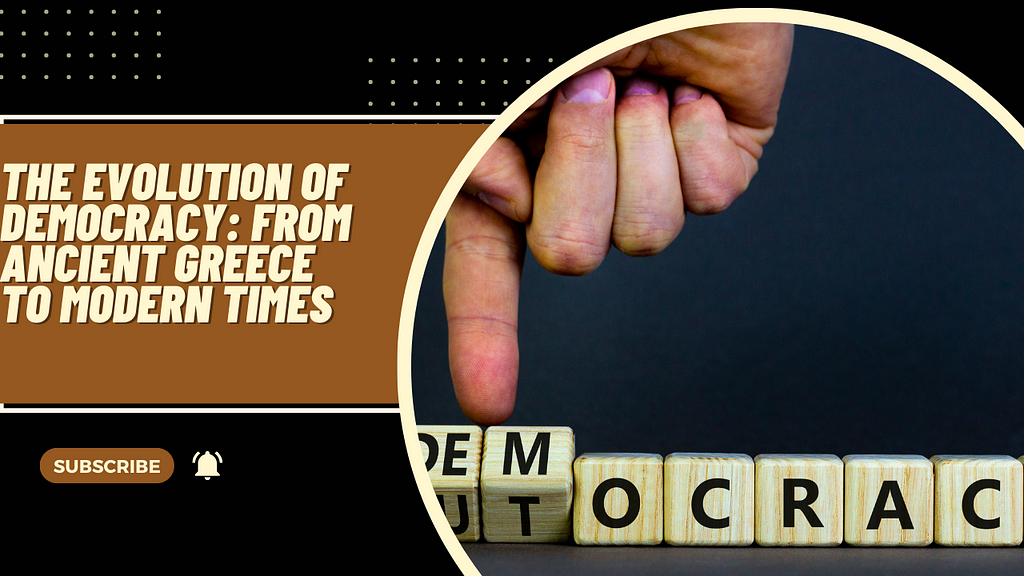
Democracy, a political system that empowers citizens to participate in decision-making processes, has undergone a remarkable evolution over the centuries. From its roots in Ancient Greece to the complex modern democracies of today, this journey reflects the dynamic nature of governance and the constant pursuit of a more inclusive and just society.
I. Birth of Democracy in Ancient Greece:
The concept of democracy finds its origins in Ancient Greece, specifically in Athens during the 5th century BCE. The Athenian model of democracy, known as “direct democracy,” allowed citizens to gather and vote on laws and policies directly. However, it’s essential to note that this form of democracy was limited, excluding women, slaves, and non-citizens from participation.
Example: The Athenian Assembly, where citizens could voice their opinions on various matters, showcased the early principles of citizen engagement in governance.
II. Representative Democracy in Rome:
While Athens set the stage, it was the Roman Republic that introduced the idea of representative democracy. Elected officials, representing the interests of the people, were entrusted with decision-making responsibilities. This system aimed to address the challenges of direct democracy, allowing for more efficient governance in a larger and more diverse society.
Example: The Roman Senate, consisting of elected representatives, exemplified the transition from direct to representative democracy, emphasizing the importance of deliberation and representation.
III. Democratic Revival in the Enlightenment Era:
After centuries of monarchies and autocracies, the Age of Enlightenment brought forth a resurgence of democratic ideals. Thinkers like John Locke and Montesquieu championed the principles of individual rights, separation of powers, and the social contract, laying the intellectual foundation for modern democracies.
Example: The American Revolution (1775–1783) and the subsequent drafting of the United States Constitution reflected the influence of Enlightenment ideals, shaping a constitutional democracy that blended representative and participatory elements.
IV. Expanding Suffrage:
The 19th and early 20th centuries witnessed significant strides in expanding suffrage rights. Movements for women’s suffrage, civil rights, and the abolition of property requirements aimed to make democracy more inclusive and representative.
Example: The suffragette movements in the late 19th and early 20th centuries, such as the women’s suffrage movement in the United States and the suffragette campaigns in the UK, resulted in significant advancements in gender equality and expanded political participation.
V. Challenges and Triumphs of the 20th Century:
The 20th century brought both triumphs and challenges for democracy. World Wars I and II highlighted the importance of democratic values in the face of totalitarianism. However, the Cold War also saw the ideological struggle between democratic and communist systems.
Example: The establishment of the United Nations in 1945 aimed to promote international cooperation and prevent conflicts, underscoring a commitment to democratic principles on a global scale.
VI. Digital Age and the Information Revolution:
The advent of the digital age has transformed the way democracies function. The internet and social media have provided unprecedented avenues for citizen engagement and activism. However, concerns about misinformation and the manipulation of public opinion have emerged as new challenges.
Example: The Arab Spring (2010–2012) demonstrated the power of social media in mobilizing citizens for political change, yet it also highlighted the complexities and uncertainties of democratization in the digital era.
The evolution of democracy from Ancient Greece to modern times reflects an ongoing quest for a system that best serves the interests of the people. As we navigate the challenges of the 21st century, understanding the historical context and lessons of the past can guide us in shaping more robust and inclusive democratic societies. The journey of democracy is far from complete, and its continued evolution will undoubtedly shape the future of governance for generations to come.
The Evolution of Democracy: From Ancient Greece to Modern Times was originally published in SapiensStorytime on Medium, where people are continuing the conversation by highlighting and responding to this story.